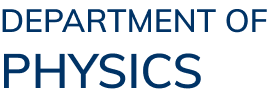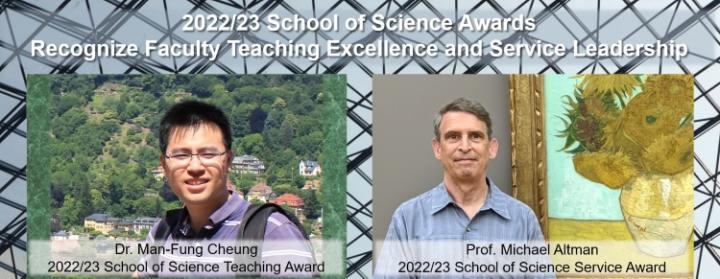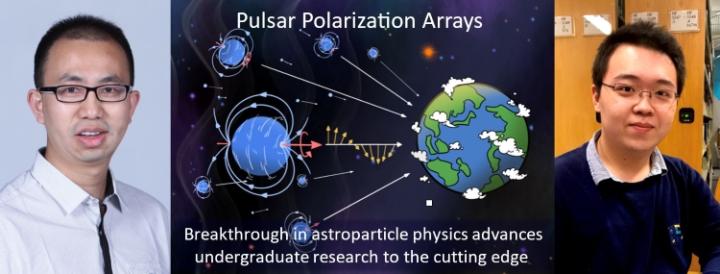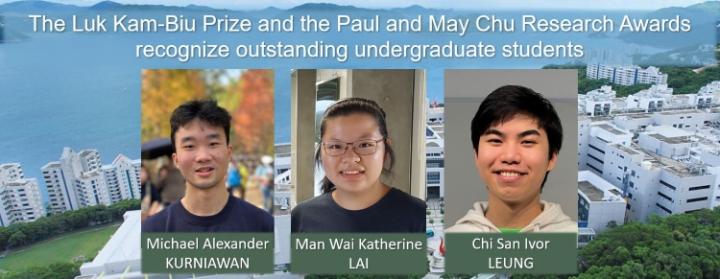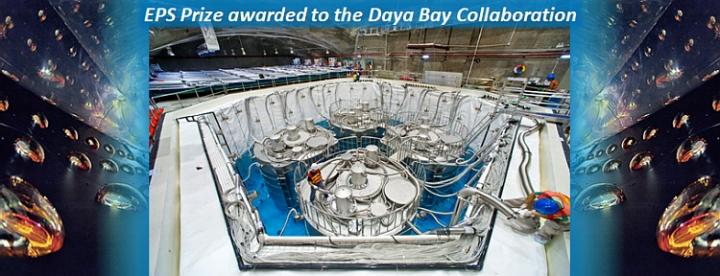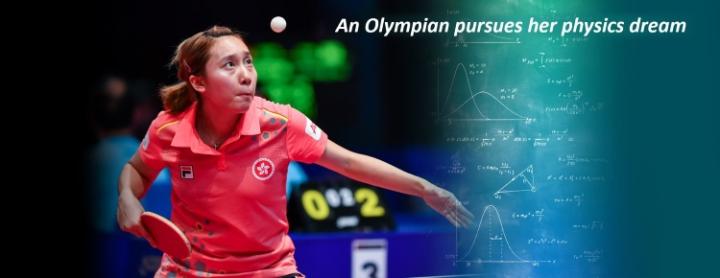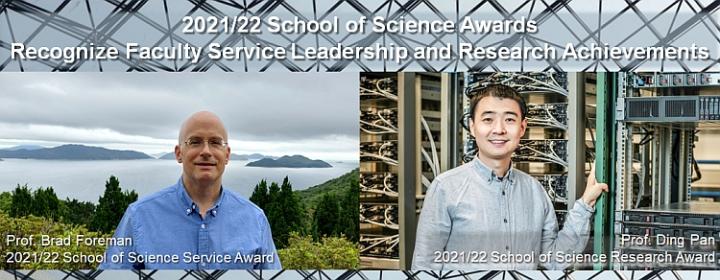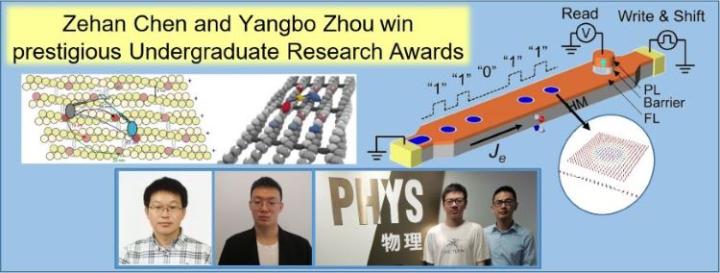News & Events
2023-09-05
Breakthrough in astroparticle physics lifts undergraduate research to the cutting edge
Prof. Tao Liu and his collaborators, Mr. Xuzixiang LOU (HKUST) and Prof. Jing Ren (Institute of High Energy Physics, Chinese Academy of Sciences, Beijing), recently proposed a pioneering experimental methodology for application in astroparticle physics with potential for far-reaching impact. Based on the observational data for pulsars accumulated over the last few decades, they proposed to construct Pulsar Polarization Arrays to explore new phenomena in astrophysics and fundamental physics. As one scientific case for the use of this new tool, Prof. Liu and his collaboration demonstrated its strong capability to detect ultralight axion-like wave dark matter. The groundbreaking concept of Pulsed Polarization Arrays and its demonstration results were published in the prestigious journal Physical Review Letters [Phys. Rev. Lett. 130, 12401 (2023)] on March 23, 2023.
There are a large number of stably rotating millisecond pulsars in the Milky Way galaxy. These pulsars are known to be extraordinary astronomical clocks and linear polarizers. As astronomical clocks, millisecond pulsars can be used to form a galaxy-scale interferometer, which is called a Pulsar Timing Array (PTA), to detect nano-Hertz gravitational waves (GWs). In pulsar timing observations for detecting the GWs, the polarization of pulses is usually also recorded for calibration purposes. Based on the readily available polarization data accumulated over decades for the PTA programs, Prof. Tao Liu and his collaboration proposed to develop Pulsar Polarization Arrays to give full play to the relevant telescope resources. By cross-correlating the polarization data from the arrayed pulsars, astronomers will be able to explore physics with a common correlated polarization signal at galaxy scale. Using this capability to study the ultralight axion-like wave dark matter as one of the mainstream dark matter candidates is such a scientific target. The ultralight axion-like wave dark matter is characterized by a strong wave nature, due to its de Broglie wavelength of astronomical scale, and meanwhile, can modulate the position angle of linearly polarized pulsar light when it travels across the galactic dark matter halo. The pulsar polarization array is thus especially suited for the detection of ultralight axion-like wave dark matter. Currently, the real data analyses are being either performed or planned in collaboration with several world-leading PTA collaborations, which include the Parkes PTA collaboration (based on the Parkes Radio Telescope) in Australia, the Chinese PTA collaboration (based on the Five Hundred Meter Aperture Spherical Telescope) in China, and the MeerTime collaboration (based on the MeerKAT Radio Telescope) in South Africa.
This research also highlights research opportunities for outstanding undergraduate students. Mr. Xuzixiang LOU, who was a key contributor and co-author of this work, was an student in the elite International Research Enrichment (IRE) undergraduate program at HKUST between 2017 – 2021. Mr. Lou was involved in research projects under Prof. Tao Liu’s close supervision during his second through fourth years of undergraduate study, working on topics ranging from collider physics to dark matter physics. He joined the project on Pulsed Pulsar Arrays in his final undergraduate year and played a key role in advancing this research work. Xuzixiang Lou was awarded the 2021 Academic Achievement Medal at HKUST in recognition of his outstanding academic performance. He will join the high energy physics research group at the State University of New York at Stony Brook as a PhD student in Fall 2023 to continue his study of fundamental physics.
Read more
2023-07-26
The Department of Physics is proud to welcome our newest faculty member:
Assistant Professor Shiming Lei received his bachelor's degree in Physics at Harbin Institute of Technology, and Ph.D. degree in Materials Science and Engineering at the Pennsylvania State University. Prior joining HKUST, he was a postdoctoral research associate in the Department of Chemistry at Princeton University and subsequently was a research scientist in the Department of Physics and Astronomy at Rice University. His research interest is in the development of novel quantum materials that host emergent electronic or magnetic properties. Of particular interest are solid-state materials with a strong interplay between spin, orbital, charge, and topology degrees of freedom. The materials properties that he is interested in include the correlated behavior in topological materials, real-space spin texture in magnetic materials, geometrical phase and their manifestation in electrical response, and tunability in properties via external stimuli (field, heat, stress, etc). His research is at the intersection of condensed matter physics, materials science, and solid-state chemistry, and benefits largely from a closed feedback-loop of materials growth, properties characterization, and functionality tuning.
Read more
2023-06-08
The Department of Physics is pleased to announce the winners of the 2022 Luk Kam-Biu Prize and the 2022 Paul and May Chu Undergraduate Research Awards. The Luk Kam-Biu Prize is awarded to Man Wai Katherine LAI. The Paul and May Chu Undergraduate Research Award is vacant, and Honorable Mentions are awarded to Michael Alexander KURNIAWAN and Chi San Ivor LEUNG. The Prize recognizes and encourages research achievements of undergraduate students in areas of experimentation, observation, or the analysis of experimental data. The Research Awards recognize physics undergraduate students for their outstanding research achievements in research in any area.
Man Wai Katherine LAI
Luk Kam-Biu Prize “For exploring the potential of future colliders to discover new, anomalous properties of the Higgs boson” under the supervision of Prof. Kirill A. Prokofiev. Man Wai Katherine LAI has worked on the physics at future colliders under the supervision of Prof. Kirill A. Prokofiev for two years prior to receiving the Prize. This project requires learning and mastering of modern Monte Carlo generators, understanding the principles of physics analysis and profound knowledge in particle physics. She has achieved all the aforementioned skills in highly independent mode through hard and attentive work. The analysis results will be published in a refereed journal. Michael Alexander KURNIAWAN
Paul and May Chu Undergraduate Research Award, Honorable Mention “For studying the dynamical transfers field Ising model using the time dependent mean field theory,” under the supervision of Prof. Xi Dai. Michael Alexander KURNIAWAN has worked on condensed matter physics under the supervision of Prof. Xi Dai since Summer 2022. In this project, Michael has finished the coding of the numerical method and found some interesting structure in the phase diagram, which is different from the observation for the static transfers field Ising model. Chi San Ivor LEUNG
Paul and May Chu Undergraduate Research Award, Honorable Mention “For making a low-cost fluorescence microscope”, under the supervision of Prof. Yi-Kuen Lee. Chi San Ivor LEUNG has worked on the problems of biomedical optics in the MEMS research lab under the supervision of Prof. Yi-Kuen Lee since Summer 2021. In this project, he successfully made a low-cost fluorescence microscope with a comparable performance to a commercial fluorescence microscope (Olympus IX70, Japan). This work was accepted by the 2022 Asia-Pacific Conference on Transducers and Micro-Nano Technology (APCOT 2022, http://apcot2022.casconf.cn), May 29~June 1, 2022 and published in the conference proceedings. He was the first author and the presenter of this paper. Read more
Luk Kam-Biu Prize “For exploring the potential of future colliders to discover new, anomalous properties of the Higgs boson” under the supervision of Prof. Kirill A. Prokofiev. Man Wai Katherine LAI has worked on the physics at future colliders under the supervision of Prof. Kirill A. Prokofiev for two years prior to receiving the Prize. This project requires learning and mastering of modern Monte Carlo generators, understanding the principles of physics analysis and profound knowledge in particle physics. She has achieved all the aforementioned skills in highly independent mode through hard and attentive work. The analysis results will be published in a refereed journal. Michael Alexander KURNIAWAN
Paul and May Chu Undergraduate Research Award, Honorable Mention “For studying the dynamical transfers field Ising model using the time dependent mean field theory,” under the supervision of Prof. Xi Dai. Michael Alexander KURNIAWAN has worked on condensed matter physics under the supervision of Prof. Xi Dai since Summer 2022. In this project, Michael has finished the coding of the numerical method and found some interesting structure in the phase diagram, which is different from the observation for the static transfers field Ising model. Chi San Ivor LEUNG
Paul and May Chu Undergraduate Research Award, Honorable Mention “For making a low-cost fluorescence microscope”, under the supervision of Prof. Yi-Kuen Lee. Chi San Ivor LEUNG has worked on the problems of biomedical optics in the MEMS research lab under the supervision of Prof. Yi-Kuen Lee since Summer 2021. In this project, he successfully made a low-cost fluorescence microscope with a comparable performance to a commercial fluorescence microscope (Olympus IX70, Japan). This work was accepted by the 2022 Asia-Pacific Conference on Transducers and Micro-Nano Technology (APCOT 2022, http://apcot2022.casconf.cn), May 29~June 1, 2022 and published in the conference proceedings. He was the first author and the presenter of this paper. Read more
2023-05-30
The 2023 European Physical Society (EPS) High Energy and Particle Physics Prize was awarded to Cecilia Jarlskog for the discovery of an invariant measure of CP violation in both quark and lepton sectors; and to the Daya Bay and RENO collaborations for the observation of short-baseline reactor electron-antineutrino disappearance, providing the first determination of the neutrino mixing angle ðœƒ!", which paves the way for the detection of CP violation in the lepton sector.
The Daya Bay Collaboration is an international team with members coming from China, U.S.A., Chile, Czech Republic, Hong Kong, Russia, and Taiwan. Professor Kam Biu Luk initiated the experiment and has been the co-spokesperson of the collaboration. Since 2021, Prof. Luk has been Chair Professor of Physics and IAS Paul C.W. Chu Professor at HKUST.
Read more
2023-05-19
Olympic medalist Minnie Soo Wai-Yam studies physics at HKUST
Minnie Soo Wai-Yam won a bronze medal in table tennis representing Hong Kong at the Tokyo Olympics in August 2021. Following this achievement, she decided to pursue her lifelong interest in physics via the Student Athletes Admission Scheme at HKUST. In this video, she talks about her passion for physics since childhood, her experiences as a first-year science student after eight years of being an elite athlete, and her college life at HKUST. As she has done in athletics, Minnie is determined to pursue her physics dream.
Facebook video
Instagram video
Further information
SCMP article
HKUST press release
Read more
2022-08-23
Congratulations to Prof. Kam Biu Luk for special recognition by the Physical Society of Hong Kong
Prof. Kam Biu Luk was elected Honorary Member by the Physical Society of Hong Kong in recognition of his research achievements and contributions to the scientific community. He was cited “For his ground-breaking discoveries and exploration of neutrino oscillations; and for his dedication to promoting science in Hong Kong.” Prof. Luk joins previously elected Honorary Members from HKUST, Prof. Paul C.W. Chu (1918) and Prof. Ping Sheng (2020).
Read more
2022-06-09
The Department of Physics is pleased to announce the inaugural winner of the Luk Kam-Biu Prize and the winners of the 2021 Paul and May Chu Undergraduate Research Awards. The Luk Kam-Biu Prize is awarded to Yan Yan CHAN. The Paul and May Chu Undergraduate Research Award is awarded to Ka Wun LEUNG, and Honorable Mentions are awarded to Yuk Lam KWOK and Wong To Anthony AU. The Prize recognizes and encourages research achievements in areas of experimentation, observation, or the analysis of experimental data. The Research Awards recognize physics undergraduate students for their outstanding achievements in research in any area.
Yan Yan CHAN
Kam-Biu Luk Prize “For the development of a silicon-photomultiplier (SiPM)-based single-photon detector for ultra-fast astronomy”, under the supervision of Prof. George Smoot. Yan Yan CHAN has worked on detector development under the supervision of Prof. George Smoot for two years prior to receiving the Prize. The main goal of this research is to develop a novel astronomical detector that can achieve temporal resolution up to sub-millisecond in order to capture unexplored optical transient astronomical signals, such as the optical counterpart of fast radio bursts. She has contributed to the mechatronic design of a cooling that will reduce the dark count noise of the SiPM sensor. Ka Wun LEUNG
Paul and May Chu UG Research Award “For the Experimental characterization of a superconducting high-entropy alloy,” under the supervision of Prof. Berthold Jäck. Ka Wun Casey LEUNG has worked on experimental condensed matter physics under the supervision of Prof. Berthold Jäck since August 2021. His research is aimed at characterizing isotropic s-wave superconductivity in high entropy alloys by analyzing the magnetic susceptibility to determine the coherence length and penetration depth. This work is summarized in a preprint arXiv:2111.11013. Yuk Lam KWOK
Paul and May Chu UG Research Award, Honorable Mention “For the numerical calculation of electronic properties of a typical two-dimensional material graphene without and with spin-orbital coupling”, under the supervision of Prof. Junwei Liu. Yuk Lam KWOK has worked on the study of band structure of materials under the supervision of Prof. Liu Junwei since February 2021. She used a tight-binding model to calculate the Hamiltonian for both two-dimensional and three-dimensional materials. The calculation was implemented on Python with the target develop a package in the future that is applicable to more general cases. Wang To Anthony AU
Paul and May Chu UG Research Award, Honorable Mention “For the development of a method to measure the neutrino mass using the data of galaxy clusters” under the co-supervision of Prof. Kirill PROKOFIEV and Prof. Thomas BROADHURST (University of the Basque Country). Wang To Anthony AU has worked on neutrino cosmology since Feb 2021 under the supervision of Prof. Kirill Prokofiev at HKUST. He made technical contributions in pioneering a new method to measure neutrino mass by surveying the gravitational effects of neutrinos on the formation of galaxy clusters. This research has the potential to estimate neutrino mass at a higher accuracy. Read more
Kam-Biu Luk Prize “For the development of a silicon-photomultiplier (SiPM)-based single-photon detector for ultra-fast astronomy”, under the supervision of Prof. George Smoot. Yan Yan CHAN has worked on detector development under the supervision of Prof. George Smoot for two years prior to receiving the Prize. The main goal of this research is to develop a novel astronomical detector that can achieve temporal resolution up to sub-millisecond in order to capture unexplored optical transient astronomical signals, such as the optical counterpart of fast radio bursts. She has contributed to the mechatronic design of a cooling that will reduce the dark count noise of the SiPM sensor. Ka Wun LEUNG
Paul and May Chu UG Research Award “For the Experimental characterization of a superconducting high-entropy alloy,” under the supervision of Prof. Berthold Jäck. Ka Wun Casey LEUNG has worked on experimental condensed matter physics under the supervision of Prof. Berthold Jäck since August 2021. His research is aimed at characterizing isotropic s-wave superconductivity in high entropy alloys by analyzing the magnetic susceptibility to determine the coherence length and penetration depth. This work is summarized in a preprint arXiv:2111.11013. Yuk Lam KWOK
Paul and May Chu UG Research Award, Honorable Mention “For the numerical calculation of electronic properties of a typical two-dimensional material graphene without and with spin-orbital coupling”, under the supervision of Prof. Junwei Liu. Yuk Lam KWOK has worked on the study of band structure of materials under the supervision of Prof. Liu Junwei since February 2021. She used a tight-binding model to calculate the Hamiltonian for both two-dimensional and three-dimensional materials. The calculation was implemented on Python with the target develop a package in the future that is applicable to more general cases. Wang To Anthony AU
Paul and May Chu UG Research Award, Honorable Mention “For the development of a method to measure the neutrino mass using the data of galaxy clusters” under the co-supervision of Prof. Kirill PROKOFIEV and Prof. Thomas BROADHURST (University of the Basque Country). Wang To Anthony AU has worked on neutrino cosmology since Feb 2021 under the supervision of Prof. Kirill Prokofiev at HKUST. He made technical contributions in pioneering a new method to measure neutrino mass by surveying the gravitational effects of neutrinos on the formation of galaxy clusters. This research has the potential to estimate neutrino mass at a higher accuracy. Read more
2022-05-19
The Mr. Armin and Mrs. Lillian Kitchell Undergraduate Research Award was established in 2010 to recognize students who demonstrate outstanding performance in the University-wide Undergraduate Research Opportunities Program (UROP) and to promote research culture among undergraduate students.
Mr. Zehan Chen won Champion of the Mr. Armin and Mrs. Lillian Kitchell Undergraduate Research Award competition in 2021. Mr. Chen, a 4th-year Physics student who is enrolled in the International Research Enrichment program. He explored the nonlinear and nonreciprocal skyrmion dynamics driven by the current under the supervision of Prof. Qiming SHAO. In Prof. Shao's group, Mr. Chen developed an analytical formulation of current-driven nonlinear skyrmion dynamics in the presence of deformation, which is verified by micromagnetic simulations. In addition, this formulation has been used to predict and understand the nonreciprocal dynamics of skyrmions. Since joining Prof. Shao’s group in September 2019, Zehan has published 2 research papers [1,2].
The Second Runner-Up of the Mr. Armin and Mrs. Lillian Kitchell Undergraduate Research Award competition was Mr. Yangbo Zhou. Mr. Zhou is a 4th year Biochemistry and Cell Biology student who carried out his award-winning research under the supervision of Prof. Hyokeun Park in the Departments of Physics and Life Science. Mr. Zhou has been working on “Real-time imaging of single motor proteins”. He along with postgraduate students tracked single myosin X molecules along actin filaments and actin bundles with an accuracy of nanometers and found that coiled-coil region of myosin X plays an important role in stepping of myosin X. His results were presented at the 66th Biophysical Society Annual Meeting held in San Francisco in the USA in Feb 2022.
[1] Zehan Chen, Xichao Zhang, Yan Zhou, and Qiming Shao, Physical Review Applied 17, L011002 (2022).
[2] Laichuan Shen, Jing Xia, Zehan Chen, Xiaoguang Li, Xichao Zhang, Oleg A. Tretiakov, Qiming Shao, Guoping Zhao, Xiaoxi Liu, Motohiko Ezawa, and Yan Zhou, Physical Review B 105, 014422 (2022).
Read more
